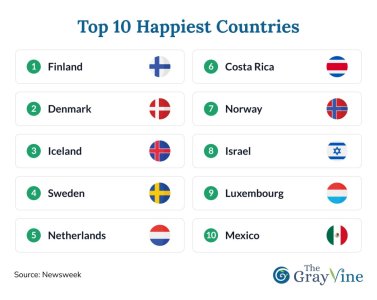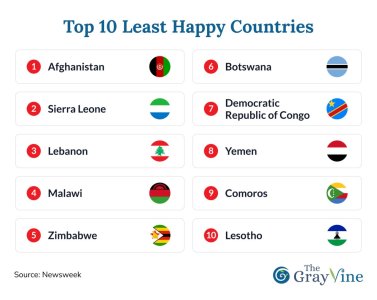Feeling blue? Globally speaking, America isn’t smiling much this year
- Replies 0
In the grand tapestry of life, happiness often feels like the thread that ties everything together. It's the goal we all strive for, the state we seek to maintain.
For many, the sense of well-being that once felt steady now seems to be slipping. A recent global report has sparked quiet concern, as new rankings suggest a noticeable shift in how Americans are experiencing everyday life.
At The GrayVine, we're exploring what might be behind this change—and how the collective mood could find its way back to brighter days.
The decline in ranking has sparked concerns about the state of Americans' well-being, suggesting a possible need for policy shifts that tackle issues like social isolation and worsening mental health.
Experts point to a rise in loneliness, especially among younger generations, as a key factor behind the US drop. The report also highlights a 53% increase in the number of Americans eating alone over the past 20 years.
This downward trend may have wider social consequences, potentially impacting workplace efficiency, community involvement, and overall quality of life.

The 2025 World Happiness Report ranks countries based on average self-reported life evaluations from 2022 to 2024.
Published annually by the Wellbeing Research Centre at the University of Oxford, the report is produced in collaboration with Gallup, the UN Sustainable Development Solutions Network, and a dedicated editorial board.
It measures global happiness using self-assessed life satisfaction and takes into account factors like GDP per capita, social support, healthy life expectancy, freedom, generosity, and perceptions of corruption.
The US saw its peak happiness ranking in 2012, placing 11th—its highest to date.
Also read: Unlock happiness: Discover the 3 life-changing truths everyone is ignoring!
Since then, the country's ranking has gradually slipped, dropping to 18th in 2020, 16th in 2022, 23rd in 2024, and now 24th in 2025, its lowest position ever.
The data also reveals a generational divide: Americans over 60 rank among the top 10 happiest, while those under 30 placed the country at a much lower 62nd, indicating significantly lower satisfaction among younger people.
Additionally, the frequency of eating alone in the US has surpassed even pandemic-era levels, a trend that may reflect rising feelings of loneliness.
According to the report, around one in four American adults now eat all of their daily meals alone, marking a more than 50% increase since 2003.
Source: CBS News / Youtube.
Meanwhile, Nordic countries continue to dominate the top of the rankings, with strong social cohesion and trust in public institutions cited as major contributors to overall happiness.
Finland maintained its position as the happiest country in the world for the eighth year in a row.
The report shares that this year's top 10 happiest countries are:
Meanwhile, Afghanistan continues to be the least happy country, accompanied by nations that struggle with economic instability and conflict.
According to the report, the top 10 least happy countries for this year are:
The World Happiness Report said, “Dining alone is not good for your wellbeing.” The report also added, "In Europe and the United States, the decline in happiness and social trust explains a large share of the rise in political polarisation and votes against 'the system'."
Gallup's insights are equally telling, with Managing Director Ilana Ron Levey noting the particular unhappiness among young Americans, who feel less supported and optimistic.
CEO Jon Clifton's words resonate deeply: “Happiness isn't just about wealth or growth—it's about trust, connection and knowing people have your back.”
Clinical therapist Melinda McGarvey and NYU's Alisha Ali echo these sentiments, pointing to the erosion of kindness, respect, and safety as factors contributing to America's happiness deficit.
Read next: Retire in Bliss! Discover 24 U.S. Havens Where Happiness Soars, Taxes Plummet, and Your Dollar Stretches Further!

What makes you happy? How can we, as a society, support each other better? Share your thoughts and let's weave a tapestry of happiness in the comments below!
For many, the sense of well-being that once felt steady now seems to be slipping. A recent global report has sparked quiet concern, as new rankings suggest a noticeable shift in how Americans are experiencing everyday life.
At The GrayVine, we're exploring what might be behind this change—and how the collective mood could find its way back to brighter days.
The decline in ranking has sparked concerns about the state of Americans' well-being, suggesting a possible need for policy shifts that tackle issues like social isolation and worsening mental health.
Experts point to a rise in loneliness, especially among younger generations, as a key factor behind the US drop. The report also highlights a 53% increase in the number of Americans eating alone over the past 20 years.
This downward trend may have wider social consequences, potentially impacting workplace efficiency, community involvement, and overall quality of life.

The United States has fallen to its worst ranking in the 2025 World Happiness Report. Image source: Pierre Bamin / Unsplash.
The 2025 World Happiness Report ranks countries based on average self-reported life evaluations from 2022 to 2024.
Published annually by the Wellbeing Research Centre at the University of Oxford, the report is produced in collaboration with Gallup, the UN Sustainable Development Solutions Network, and a dedicated editorial board.
It measures global happiness using self-assessed life satisfaction and takes into account factors like GDP per capita, social support, healthy life expectancy, freedom, generosity, and perceptions of corruption.
The US saw its peak happiness ranking in 2012, placing 11th—its highest to date.
Also read: Unlock happiness: Discover the 3 life-changing truths everyone is ignoring!
Since then, the country's ranking has gradually slipped, dropping to 18th in 2020, 16th in 2022, 23rd in 2024, and now 24th in 2025, its lowest position ever.
The data also reveals a generational divide: Americans over 60 rank among the top 10 happiest, while those under 30 placed the country at a much lower 62nd, indicating significantly lower satisfaction among younger people.
Additionally, the frequency of eating alone in the US has surpassed even pandemic-era levels, a trend that may reflect rising feelings of loneliness.
According to the report, around one in four American adults now eat all of their daily meals alone, marking a more than 50% increase since 2003.
Source: CBS News / Youtube.
Meanwhile, Nordic countries continue to dominate the top of the rankings, with strong social cohesion and trust in public institutions cited as major contributors to overall happiness.
Finland maintained its position as the happiest country in the world for the eighth year in a row.
The report shares that this year's top 10 happiest countries are:
Meanwhile, Afghanistan continues to be the least happy country, accompanied by nations that struggle with economic instability and conflict.
According to the report, the top 10 least happy countries for this year are:
The World Happiness Report said, “Dining alone is not good for your wellbeing.” The report also added, "In Europe and the United States, the decline in happiness and social trust explains a large share of the rise in political polarisation and votes against 'the system'."
Gallup's insights are equally telling, with Managing Director Ilana Ron Levey noting the particular unhappiness among young Americans, who feel less supported and optimistic.
CEO Jon Clifton's words resonate deeply: “Happiness isn't just about wealth or growth—it's about trust, connection and knowing people have your back.”
Clinical therapist Melinda McGarvey and NYU's Alisha Ali echo these sentiments, pointing to the erosion of kindness, respect, and safety as factors contributing to America's happiness deficit.
Read next: Retire in Bliss! Discover 24 U.S. Havens Where Happiness Soars, Taxes Plummet, and Your Dollar Stretches Further!
Key Takeaways
- The United States has fallen to its worst ranking in the 2025 World Happiness Report, positioned at 24th in the world, which indicates a decline in the overall well-being of its citizens.
- Expert analysis suggests the decrease in US happiness may be due to rising loneliness rates, particularly among young people, with a significant increase in the number of Americans eating alone.
- Nordic countries continue to top the happiness rankings, with Finland maintaining its position as the happiest nation for the eighth consecutive year, highlighting the importance of social cohesion and trust in institutions.
- The decline in American happiness and social trust has been linked to increasing political polarization, and is prompting discussion concerning the need to improve social well-being through community and mental health initiatives.
What makes you happy? How can we, as a society, support each other better? Share your thoughts and let's weave a tapestry of happiness in the comments below!
Last edited:








